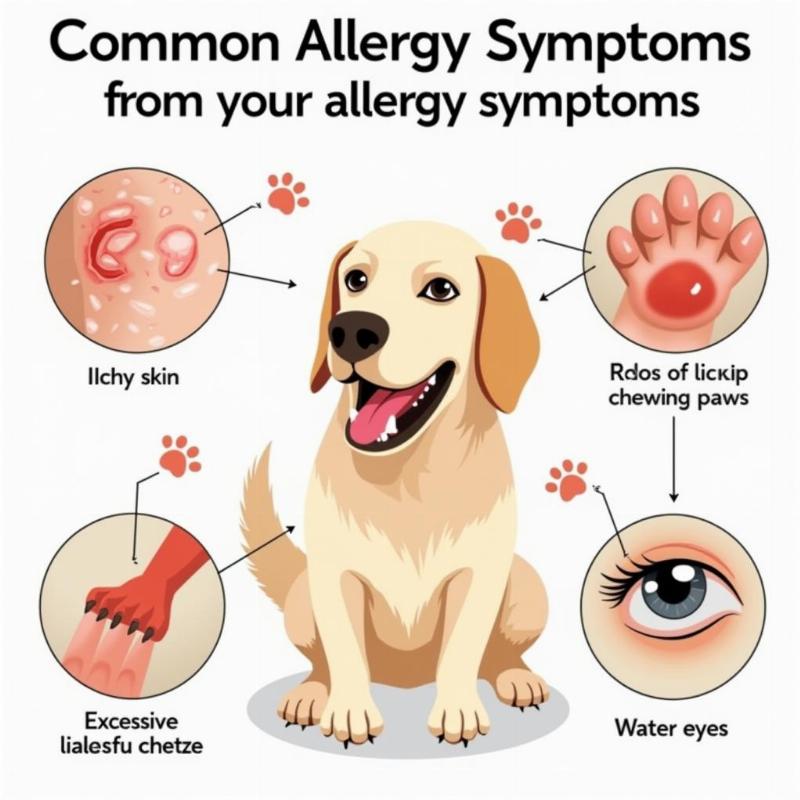Understanding and managing allergies in dogs can be challenging. Allergy test kits for dogs offer a convenient way to potentially pinpoint the triggers causing your furry friend’s discomfort. From environmental allergens like pollen and dust mites to food sensitivities, these at-home tests promise to provide valuable insights into your dog’s allergies. But how effective are they, and what should you know before using one? This comprehensive guide will explore everything you need to know about allergy test kits for dogs, empowering you to make informed decisions for your pet’s health.
Understanding Dog Allergies in the US
Just like humans, dogs can suffer from a variety of allergies. These allergies can manifest in various ways, including itchy skin, excessive licking or chewing, ear infections, gastrointestinal issues, and even respiratory problems. Identifying the specific allergen causing these symptoms is crucial for effective management. Common allergens in the US include pollen (from trees, grasses, and weeds), dust mites, mold spores, certain foods (like beef, chicken, dairy, and wheat), and flea bites. Understanding the prevalence of these allergens in your region can help you narrow down potential triggers.
 Dog Showing Allergy Symptoms
Dog Showing Allergy Symptoms
Types of Allergy Test Kits for Dogs
There are several types of allergy test kits for dogs available on the market. The most common are blood tests and saliva tests. These tests analyze your dog’s blood or saliva for antibodies against specific allergens. Some kits focus on environmental allergens, while others test for food sensitivities. It’s important to choose a test that aligns with your dog’s suspected allergies.
How to Use an Allergy Test Kit for Dogs
Most allergy test kits for dogs are relatively easy to use at home. They typically involve collecting a small sample of your dog’s blood or saliva and sending it to a laboratory for analysis. Detailed instructions are usually included with the kit. However, consulting with your veterinarian before and after using a test is highly recommended. dog allergy testing at home
Interpreting the Results
Once you receive the results, it’s essential to understand what they mean. The report will typically list the allergens your dog tested positive for, along with a severity level. However, a positive result doesn’t necessarily mean your dog is clinically allergic to that substance. It simply indicates the presence of antibodies. Your veterinarian can help you interpret the results and develop a management plan tailored to your dog’s specific needs. can dogs eat fenugreek seeds
Are Allergy Test Kits for Dogs Accurate?
The accuracy of allergy test kits for dogs is a topic of debate among veterinarians. While these tests can be helpful in identifying potential allergens, they are not always foolproof. False positives and false negatives can occur. Factors that can influence accuracy include the quality of the test kit, the laboratory used for analysis, and individual variations in dogs’ immune responses.
When to See a Veterinarian
While allergy test kits can provide valuable information, they should not replace a visit to your veterinarian. If your dog is showing signs of allergies, it’s crucial to seek professional advice. Your veterinarian can perform a thorough examination, rule out other underlying medical conditions, and recommend the most appropriate diagnostic and treatment options. This might include skin testing, elimination diets, medication, or immunotherapy.
Managing Dog Allergies
Managing dog allergies often involves a multifaceted approach. This may include avoiding identified allergens, implementing environmental control measures (like frequent cleaning and air filtration), using medications to control symptoms, and providing a balanced diet. dogs at zion national park
Conclusion
Allergy test kits for dogs can be a useful tool in identifying potential allergens, but they should be used in conjunction with veterinary guidance. Understanding the limitations of these tests and interpreting the results accurately is crucial for effective allergy management. By working closely with your veterinarian, you can help your furry friend live a comfortable and itch-free life. ginger snap cookies for dogs just food for dogs chicken and rice recipe
FAQ
- How much do allergy test kits for dogs cost? Prices can vary depending on the type of test and the company, but they generally range from $50 to $200.
- How long does it take to get the results? Most companies provide results within a few weeks of receiving the sample.
- Can I treat my dog’s allergies based solely on the results of an at-home test? No, it’s essential to consult with your veterinarian for a proper diagnosis and treatment plan.
- Are there any side effects to using an allergy test kit? The tests themselves are generally safe and non-invasive. Blood tests may cause slight bruising at the collection site, and saliva tests may cause mild discomfort.
- What if my dog tests positive for multiple allergens? Your veterinarian can help you prioritize which allergens to address first and develop a comprehensive management plan.
- Are there any breeds predisposed to allergies? Certain breeds, such as Bulldogs, French Bulldogs, Golden Retrievers, and German Shepherds, are more prone to developing allergies.
- Can allergies develop in older dogs? Yes, allergies can develop at any age, even in senior dogs.
Beautdogs.us is your premier source for comprehensive and reliable information on dog breeds, care, and products in the US. We offer expert advice and resources for dog owners of all levels, from seasoned professionals to first-time puppy parents. Our mission is to empower you with the knowledge and tools you need to provide the best possible care for your canine companion. Learn more about dog care and connect with us at [email protected] or call us at +1 501-555-7529. Visit Beautdogs.us today!